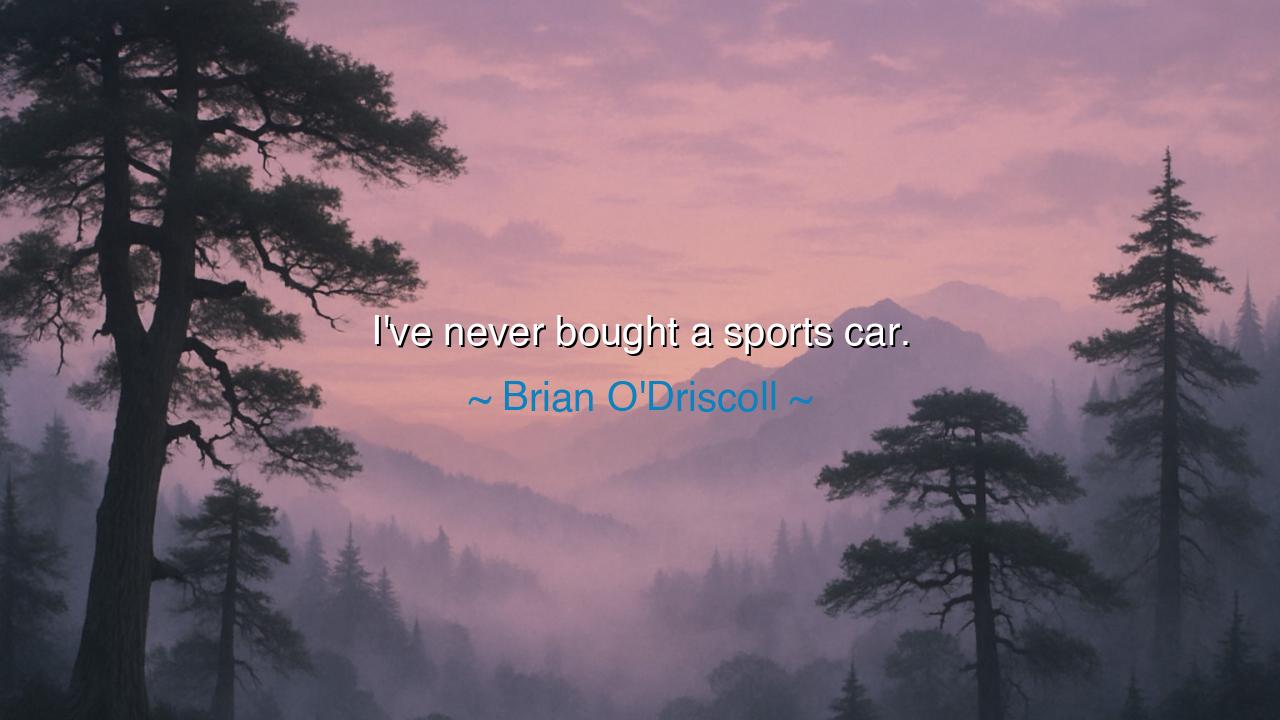
I've never bought a sports car.






The words of Brian O’Driscoll, the great warrior of the rugby field, seem at first almost trivial: “I’ve never bought a sports car.” Yet to those who listen deeply, they reveal a philosophy of life rooted not in excess, but in humility, discipline, and a devotion to values higher than vanity. For in a world where many who taste greatness rush to surround themselves with symbols of wealth, O’Driscoll’s confession is a declaration that true strength does not require adornment. His treasure was not in polished metal, but in the sweat and struggle of the game.
The meaning of this quote lies in its rejection of false measures of success. To own a sports car has long been a symbol of achievement, a sign of luxury, of having “made it.” Yet O’Driscoll, despite a career filled with glory, tells us he never sought such things. He reminds us that the truest victories are not bought, but earned — and they are carried not in possessions but in character. His life was defined by tries scored, battles fought, and respect earned on the field, not by what sat in his driveway.
The origin of these words comes from O’Driscoll’s journey as one of Ireland’s greatest rugby players. Rising from a young hopeful to the captain of his nation, he became a figure of honor, resilience, and leadership. Along the way, fame and fortune might have tempted him, but his focus remained fixed on performance, on team, and on legacy. In saying he never bought a sports car, he was not merely recounting a personal choice — he was declaring that his fulfillment was found in discipline, loyalty, and the pursuit of greatness through sport, not through symbols of wealth.
History is filled with similar voices. The Stoic philosopher Epictetus owned little, yet taught kings the art of endurance. Mahatma Gandhi walked the earth with the simplest of possessions, yet his influence outshone emperors. Even Marcus Aurelius, emperor of Rome, warned against being seduced by luxury, insisting that virtue alone is the measure of a man. O’Driscoll’s words, though spoken in the modern age, carry this same ancient current: that humility is stronger than extravagance, and that discipline shines brighter than gold.
There is also a heroic defiance in these words. In a culture that measures success by possessions, to say “I’ve never bought a sports car” is to stand against the tide. It is to say: I define myself, not the world. I choose substance over image, character over appearance. This is the warrior’s creed, for the true fighter knows that victories are proven in the arena, not in the marketplace. O’Driscoll’s life proved this creed again and again, as he sacrificed his body for his team, leaving behind a legacy carved not in luxury but in loyalty.
The lesson for us is simple but profound: beware of measuring your worth by what you own. The car, the house, the treasures of the world — they can dazzle, but they cannot endure. What endures is courage, integrity, the willingness to give yourself fully to the work or the calling you love. Like O’Driscoll, seek not to accumulate, but to contribute. For when the final whistle of life blows, it is not the possessions left behind that will be remembered, but the impact you had on others.
So let us take this teaching to heart: let us live so that we, too, can say with quiet strength, “I have never needed the trappings of glory, for I found glory in my deeds.” In this way, we join the lineage of those who understood that true greatness is not purchased, but earned — in sweat, in sacrifice, and in the love of something greater than the self. And in that truth lies the eternal victory.






AAdministratorAdministrator
Welcome, honored guests. Please leave a comment, we will respond soon